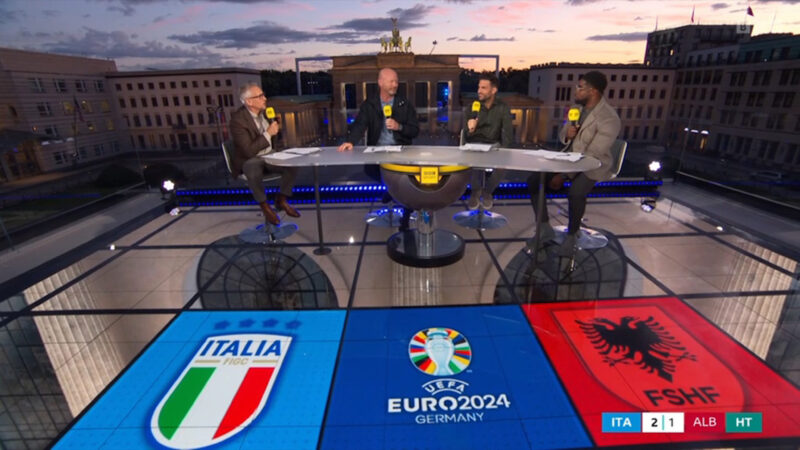
BBC Sports is ready to elevate its coverage of the UEFA 2024 Championship with a series of live broadcasts from a remarkable open-air studio in front of the iconic Brandenburg Gate in Berlin. This cutting-edge studio, featuring state-of-the-art ROE Visual LED panels, uses advanced virtual production technologies.
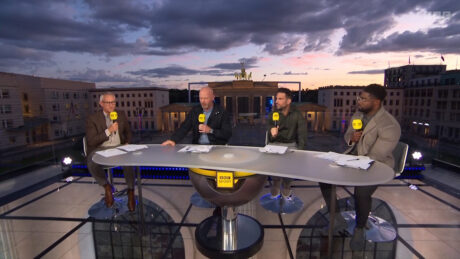 The BBC Sport design team, led by John Murphy, Design Director, already had extensive experience using extended reality (XR) features, like chroma key technology, in their Salford studio. When Executive Producer Phil Bigwood and Lead Director Colm Harty saw ROE Visual’s presentation at IBC 2023, they were convinced they could elevate their UEFA 2024 coverage to a new, engaging level. Teaming up with Chris Izatt, Director of VP and Innovation at AE Live, they embarked on bringing this concept to life in Berlin.
The BBC Sport design team, led by John Murphy, Design Director, already had extensive experience using extended reality (XR) features, like chroma key technology, in their Salford studio. When Executive Producer Phil Bigwood and Lead Director Colm Harty saw ROE Visual’s presentation at IBC 2023, they were convinced they could elevate their UEFA 2024 coverage to a new, engaging level. Teaming up with Chris Izatt, Director of VP and Innovation at AE Live, they embarked on bringing this concept to life in Berlin.
As it was important for all parties involved to test the critical elements of the envisioned production in advance, the journey to this innovative setup began on a dreary November day when a delegation from BBC Sport visited ROE Visual and its rental partner, Faber, in the Netherlands. The BBC Sport, Faber, and ROE Visual teams convened to test the ambitious ideas for UEFA 2024. The series of tests provided “incredibly useful learnings,” prompting the team to refine their initial plans and carefully weigh creative and technical decisions.
Following these productive tests, a final comprehensive test was held closer to home for the BBC team at ROE Visual’s office in Production Park, near Leeds. This full-scale studio test, meticulously prepared by Simon Morton, Support Engineer for ROE Visual UK, included an OB truck, cameras, lights, and tracking systems and thoroughly evaluated the performance of the ROE Visual LED panels in daylight conditions.
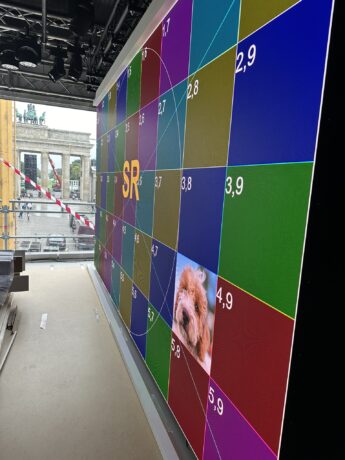 Key tests included performance comparisons of different LED flooring products under varying lighting conditions and pixel pitch comparisons for indoor video walls. Additionally, various camera tracking systems were tested to ensure flawless execution during the live broadcasts in Berlin. The first setup involved an on-camera comparison of Black Marble 4 Matte vs. Black Marble 4 Glass, tested outdoors in full daylight and at dusk. The second setup tested a Ruby 1.9 BV2 wall and a Ruby 2.3 wall for pixel pitch and on-camera performance, simulating the ambient light conditions of the Berlin studio.
Key tests included performance comparisons of different LED flooring products under varying lighting conditions and pixel pitch comparisons for indoor video walls. Additionally, various camera tracking systems were tested to ensure flawless execution during the live broadcasts in Berlin. The first setup involved an on-camera comparison of Black Marble 4 Matte vs. Black Marble 4 Glass, tested outdoors in full daylight and at dusk. The second setup tested a Ruby 1.9 BV2 wall and a Ruby 2.3 wall for pixel pitch and on-camera performance, simulating the ambient light conditions of the Berlin studio.
At this stage, the input of Jens Weber, the renowned German architect who has designed numerous international physical studio projects for BBC Sport, was crucial. Jens played a pivotal role in the seamless transition from the virtual to the physical world. “Jens dictates what is possible virtually with his layout of the interior studio and rooftop design,” said Chris Izatt from AELive. With overwhelmingly positive outcomes, the BBC Sports team embarked on this visionary and challenging project with renewed confidence.
The setup in Berlin includes two studios: an outdoor terrace studio and an indoor studio, seamlessly integrated with extended reality (XR) technology. The architectural design of the XR elements creates a cohesive look, reflecting the style of the Brandenburg Gate and providing a Berlin Museum feel, referring to the history of Euro tournaments. Combining LED technology with tracking, graphics, and XR in such a dynamic and environmentally challenging setup is a first for the BBC team.
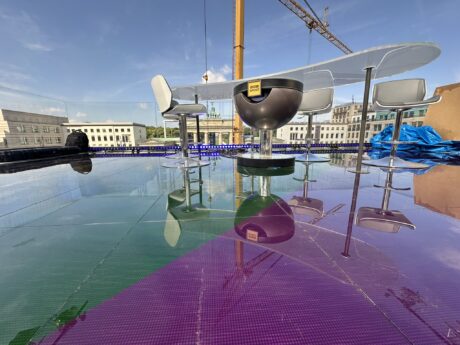
The LED floor, a vital feature of the outdoor studio, presented unique challenges due to its need for weather resistance and reflective properties. The glossy floor had to be practical and vibrant enough to work in daylight and come to life at nighttime, with reflections adding a unique visual dimension. Virtual sections are framed to align with actual panel seams, enhancing the illusion of natural glass. The indoor studio provides an alternative to the external terrace for inclement weather and a wider range of AR graphics for in-depth game profiles. Using both studios also allows for simultaneous productions with shared rendering machines.
ROE Visual’s Ruby RB1.9 broadcast premium LED panel is ideal for XR camera work in confined studio spaces. The interaction between the Ruby RB1.9 LED panel, LED processing, media play-out system, and camera tracking perfectly fulfills the BBC’s requirements for fast graphics changes, AR implementation, and multi-frame use.
The addition of rental partner Faber’s evidentially experienced team paid off for the construction of the indoor studio. Steven Ackein, head of projects for Faber, devised an innovative sliding mechanism around the indoor LED walls. “With all the creativity, it was also essential to ensure safety and maintenance aspects for the production,” said Ackein.
“Collaborating with the BBC team on this project has demonstrated that we can create compelling productions by pooling resources and expertise. We are incredibly proud to have accomplished this innovative studio alongside all the teams involved. I can’t wait to see it go live!” commented Olaf Sperwer, responsible for Business Development in Virtual Production at ROE Visual.
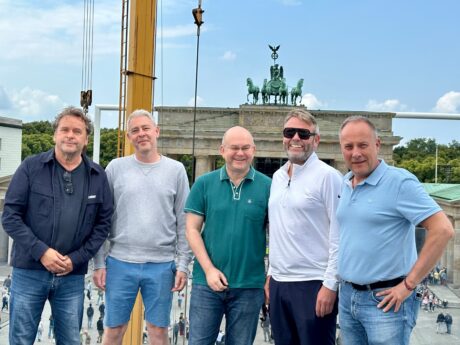
The studio will be the BBC’s broadcasting location for the UEFA 2024 competition, starting on 14 June and running for four weeks. Everything is ready for this marathon production, and we are all excited to see how viewers and fans will receive the immersive world.
Further information from ROE Visual: www.roevisual.com


